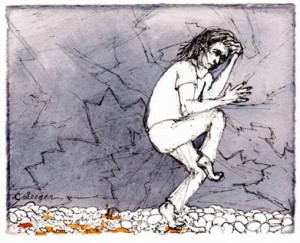
Sermons
Take One For the Team - Genesis 39
(LEADER) Garments have played a prominent role in the last three chapters of Genesis (Joseph’s coat, Tamar’s veil, and Joseph’s garment taken by Potiphar’s wife). Ask a few people to tell stories from their lives when clothing played a key role. (Ex. disagreements with parents about what to wear; the first time they tried to dress themselves; strange things they wore; clothes they had to wear for work that they wouldn’t be caught dead in; etc.)(LEADER) What’s one thing from last weekend’s message that you hope to talk about as a group?Invite someone to read Genesis 12:1-3(LEADER) How is the LORD’s choosing, or electing, evident in this passage?(LEADER) Keeping in mind Genesis 3-11, how is God’s choosing Abraham gracious? Was humanity interested in bearing God’s image throughout the earth? (Remember that Abraham was part of cultural project of Genesis 11:1-9).Invite someone to read the following quote: “Israel, the people of Abraham, was conscious of a unique role and status among the nations given to them by God in his act of choosing and calling Abraham. Certain things were true of them that were not true of other peoples. God did certain things in relation to them that he did not do to others. Much was demanded of them that was not, in quite the same way, demanded of others. Great was their privilege. Greater still was their responsibility.” from The Mission of God by Christopher J. H. WrightInvite someone to read Genesis 39:1-12(LEADER) How did God work through Joseph, one of Abraham’s offspring, to fulfill his promise to bring blessing to the nations? How did Joseph bless Potiphar by refusing his wife?(LEADER) How has God been using you to be a blessing to others, even if they are not part of the Church? Be concrete and specific. (examples include in-laws; friend at the water cooler; Panera; Christmas-time; tax season; etc)Invite someone to read 1 Peter 2:19-25(LEADER) How do the Apostle Peter’s words clarify that God’s gracious election of us means sometimes “taking one for the team”?(LEADER) How is it most true in the life of our Christ our Savior?(LEADER) Where have you experienced difficulty in relationship with others because of your commitment to God’s agenda?(LEADER) How could God still use that to further help the Church or even those who caused you difficulty?
Geared for the Weak - Genesis 38
[caption id="attachment_4263" align="alignright" width="191"]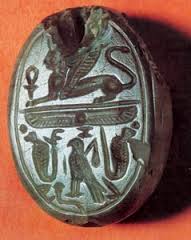 Jezebel's Royal Seal in the Israel Museum, Jerusalem[/caption]Dr. John Walton, of Wheaton University, writes, “Judah’s guarantee of payment for his act of prostitution is his seal, cord, and staff. The seal is most likely a stamp seal engraved with a design that would uniquely identify Judah. It would be used by him for any transaction or correspondence much as we use a signature today… Seals were often worn around the neck on a cord…his staff is a walking stick but may have been a symbol of authority in his clan. If so, Tamar holds in her possession symbols of his individual and corporate identity – in modern terms, items akin to someone’s driver’s license” (The NIV Application Commentary: Genesis, 669).(LEADER) Enter into the story of Genesis 38 and get to know each other better by asking willing participants to pass their license around to the other participants. Ask them to tell a story about when they had their picture, what the DMV was like, or something like that.(If anyone is interested in having a good reference book on the cultural background of the Old Testament they can purchase the IVP Bible Background Commentary edited by Walton, Matthews and Chavalas.)Everybody quietly read Genesis 38:1-11.(LEADER) Ask if anyone can explain how the powerful (Judah and his sons) in those verses are keeping the less powerful (Tamar) in a position of weakness. How are the powerful displayed as not giving the weak the benefit of the doubt?Everybody quietly read Genesis 38:12-30.(LEADER) Ask if anyone can recall how the passage displays God gearing his kingdom for the sake of the weak (Tamar).(LEADER) Ask which systems today (work, family, society, church, economy, sports, etc.) are geared toward those in power? Which systems are geared toward those who are not in the positions of power?(LEADER) Matthew 1:2-6 mentions that Tamar, as well as Gentile-women like Rahab and Ruth, are part of Jesus’ family line. What does this tell you about how God uses weakness and powerlessness in his kingdom? How does this give you hope?(LEADER) As the Apostle Paul neared the end of his life, he wrote to his protégé
Jezebel's Royal Seal in the Israel Museum, Jerusalem[/caption]Dr. John Walton, of Wheaton University, writes, “Judah’s guarantee of payment for his act of prostitution is his seal, cord, and staff. The seal is most likely a stamp seal engraved with a design that would uniquely identify Judah. It would be used by him for any transaction or correspondence much as we use a signature today… Seals were often worn around the neck on a cord…his staff is a walking stick but may have been a symbol of authority in his clan. If so, Tamar holds in her possession symbols of his individual and corporate identity – in modern terms, items akin to someone’s driver’s license” (The NIV Application Commentary: Genesis, 669).(LEADER) Enter into the story of Genesis 38 and get to know each other better by asking willing participants to pass their license around to the other participants. Ask them to tell a story about when they had their picture, what the DMV was like, or something like that.(If anyone is interested in having a good reference book on the cultural background of the Old Testament they can purchase the IVP Bible Background Commentary edited by Walton, Matthews and Chavalas.)Everybody quietly read Genesis 38:1-11.(LEADER) Ask if anyone can explain how the powerful (Judah and his sons) in those verses are keeping the less powerful (Tamar) in a position of weakness. How are the powerful displayed as not giving the weak the benefit of the doubt?Everybody quietly read Genesis 38:12-30.(LEADER) Ask if anyone can recall how the passage displays God gearing his kingdom for the sake of the weak (Tamar).(LEADER) Ask which systems today (work, family, society, church, economy, sports, etc.) are geared toward those in power? Which systems are geared toward those who are not in the positions of power?(LEADER) Matthew 1:2-6 mentions that Tamar, as well as Gentile-women like Rahab and Ruth, are part of Jesus’ family line. What does this tell you about how God uses weakness and powerlessness in his kingdom? How does this give you hope?(LEADER) As the Apostle Paul neared the end of his life, he wrote to his protégé  Timothy, “All Scripture is breathed out by God” (2 Timothy 3:16). Genesis 38 is a passage which refers to a variety of sexual activity. Explain why this is a good thing for the people of God to know. How is this a resource to families? Ask if any members have wisdom about how to discuss sexual activity to children and teens. Ask if any would like to share a story of how they learned about these things.
Timothy, “All Scripture is breathed out by God” (2 Timothy 3:16). Genesis 38 is a passage which refers to a variety of sexual activity. Explain why this is a good thing for the people of God to know. How is this a resource to families? Ask if any members have wisdom about how to discuss sexual activity to children and teens. Ask if any would like to share a story of how they learned about these things.
Genesis 37:2-36
2 This is the account of Jacob’s family line. Joseph, a young man of seventeen, was tending the flocks with his brothers, the sons of Bilhah and the sons of Zilpah, his father’s wives, and he brought their father a bad report about them.3 Now Israel loved Joseph more than any of his other sons, because he had been born to him in his old age; and he made an ornate robe for him. 4 When his brothers saw that their father loved him more than any of them, they hated him and could not speak a kind word to him. 5 Joseph had a dream, and when he told it to his brothers, they hated him all the more. 6 He said to them, “Listen to this dream I had: 7 We were binding sheaves of grain out in the field when suddenly my sheaf rose and stood upright, while your sheaves gathered around mine and bowed down to it.” 8 His brothers said to him, “Do you intend to reign over us? Will you actually rule us?” And they hated him all the more because of his dream and what he had said.9 Then he had another dream, and he told it to his brothers. “Listen,” he said, “I had another dream, and this time the sun and moon and eleven stars were bowing down to me.” 10 When he told his father as well as his brothers, his father rebuked him and said, “What is this dream you had? Will your mother and I and your brothers actually come and bow down to the ground before you?” 11 His brothers were jealous of him, but his father kept the matter in mind.12 Now his brothers had gone to graze their father’s flocks near Shechem, 13 and Israel said to Joseph, “As you know, your brothers are grazing the flocks near Shechem. Come, I am going to send you to them.” “Very well,” he replied. 14 So he said to him, “Go and see if all is well with your brothers and with the flocks, and bring word back to me.” Then he sent him off from the Valley of Hebron.When Joseph arrived at Shechem, 15 a man found him wandering around in the fields and asked him, “What are you looking for?” 16 He replied, “I’m looking for my brothers. Can you tell me where they are grazing their flocks?” 17 “They have moved on from here,” the man answered. “I heard them say, ‘Let’s go to Dothan.’” So Joseph went after his brothers and found them near Dothan.18 But they saw him in the distance, and before he reached them, they plotted to kill him. 19 “Here comes that dreamer!” they said to each other. 20 “Come now, let’s kill him and throw him into one of these cisterns and say that a ferocious animal devoured him. Then we’ll see what comes of his dreams.” 21 When Reuben heard this, he tried to rescue him from their hands. “Let’s not take his life,” he said. 22 “Don’t shed any blood. Throw him into this cistern here in the wilderness, but don’t lay a hand on him.” Reuben said this to rescue him from them and take him back to his father. 23 So when Joseph came to his brothers, they stripped him of his robe—the ornate robe he was wearing— 24 and they took him and threw him into the cistern. The cistern was empty; there was no water in it.25 As they sat down to eat their meal, they looked up and saw a caravan of Ishmaelites coming from Gilead. Their camels were loaded with spices, balm and myrrh, and they were on their way to take them down to Egypt. 26 Judah said to his brothers, “What will we gain if we kill our brother and cover up his blood? 27 Come, let’s sell him to the Ishmaelites and not lay our hands on him; after all, he is our brother, our own flesh and blood.” His brothers agreed. 28 So when the Midianite merchants came by, his brothers pulled Joseph up out of the cistern and sold him for twenty shekels of silver to the Ishmaelites, who took him to Egypt.29 When Reuben returned to the cistern and saw that Joseph was not there, he tore his clothes. 30 He went back to his brothers and said, “The boy isn’t there! Where can I turn now?” 31 Then they got Joseph’s robe, slaughtered a goat and dipped the robe in the blood. 32 They took the ornate robe back to their father and said, “We found this. Examine it to see whether it is your son’s robe.” 33 He recognized it and said, “It is my son’s robe! Some ferocious animal has devoured him. Joseph has surely been torn to pieces.” 34 Then Jacob tore his clothes, put on sackcloth and mourned for his son many days. 35 All his sons and daughters came to comfort him, but he refused to be comforted. “No,” he said, “I will continue to mourn until I join my son in the grave.” So his father wept for him. 36 Meanwhile, the Midianites sold Joseph in Egypt to Potiphar, one of Pharaoh’s officials, the captain of the guard.
Dynamically Living with God - Genesis 35:1-15
 Jacob’s name change to Israel is re-affirmed in Genesis 35. “What is the background of your name? Why were you given your name? Were you, for instance, named after a relative, family friend, biblical character, athlete, movie star?” (taken from Dan Allender’s To Be Told)
Jacob’s name change to Israel is re-affirmed in Genesis 35. “What is the background of your name? Why were you given your name? Were you, for instance, named after a relative, family friend, biblical character, athlete, movie star?” (taken from Dan Allender’s To Be Told)
- The Christian life is a dynamic one where we, as God’s people, are meant to interact with God in intimate covenant communion for the sake of the building of the Kingdom of his Son Jesus Christ. We saw this in the relationship between Jacob and God Almighty (El Shaddai) in Genesis 35. First God instructed Jacob how to relate to him, Jacob/Israel obeyed and then God met him again in a revealing of his promises to Israel for personal communion and kingdom building.
- The promises made to Jacob/Israel in Genesis 35 contain references to many other places in the Bible. These promises have been referred to as the 4 “P”s. Does anyone remember what they are?
- Have different members in the group turn to Genesis 1:26-28; 9:1; 12:1-3, 17:4-8 and 35:11-12 and show where they find the four “P”s of God’s covenant promises affirmed.
- What is one thing from last week’s sermon that you hoped we would talk about and why?
The Grace of the Law - Genesis 34
[caption id="attachment_4215" align="alignleft" width="196"] Moses, by Marc Chagall 1956[/caption]Following are questions for conversation based on the Genesis 34 sermon. Please feel free to leave questions or comment.
Moses, by Marc Chagall 1956[/caption]Following are questions for conversation based on the Genesis 34 sermon. Please feel free to leave questions or comment.
- Who is the author of Genesis? (Moses)
- Who is the original audience for whom the book of Genesis was originally written? (Israel after the Exodus and on the way to the promised land)
Read Genesis 34:
- Who is Dinah’s mother? Is she the more or less favored wife of Jacob?
- As appropriate to your group, discuss the following: What did Shechem do to Dinah?
- Has God revealed his laws to Israel at this point in history? When does God give the Ten Commandments and subsequent laws to Israel?
- How would God’s law have helped in a situation like this? (see Exodus 22:16-17 and Deuteronomy 22:28-29).
- Why might Jacob have under-reacted in hearing about the mistreatment of Dinah? (compare Jacob’s reaction in Genesis 34:5 to his reaction to Joseph’s supposed death in 37:31-35)
- When have you experienced or witnessed an under-reaction to evil? Share with the group.
- When the sons of Jacob return they react very strongly (v. 7) but then fail to exact a punishment that fit the crime (v. 25-29). How would laws from God have been a helpful provision in this case? Do any laws from the Old Testament come to mind as particularly relevant to this case? (see Exodus 21:23-24).
- When have you experienced or witnessed an over-reaction to evil? Share with the group.
- At the end of the story (v. 30-31) there is a disagreement between Jacob and his sons about what should have been done in response to Dinah’s severe mistreatment. Explain how this ending is “ambiguous.”
- How do God’s laws given to Israel clear up that ambiguity?
- The main point of this sermon was that the law is grace. How is law (or instruction) gracious?[caption id="attachment_4216" align="alignright" width="228"]
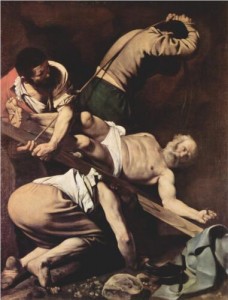 Crucifixion of Saint Peter, by Caravaggio 1601[/caption]
Crucifixion of Saint Peter, by Caravaggio 1601[/caption] - Jesus, in John 13:34, commands his disciples. What has he commanded us to do?
- How is Jesus' instruction to love like him (laying down your life for others as he has laid down his life for us) a gracious thing?
- No one perfectly loves like Jesus, and that is why we need to continually be reminded that we are rooted in his sacrificial, complete and perfect love for us (Ephesians 3:14-21). When have you seen a local church love like Jesus, laying down its life for the sake of others? What opportunities does Crossroads have to love others like Jesus?
God's Tricky but He's Good - Genesis 32:22-32
[caption id="attachment_4167" align="alignright" width="300"]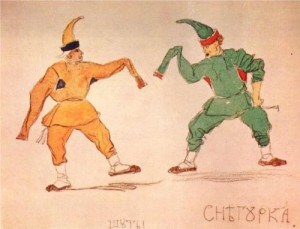 Jesters by Viktor Vasnetsov, 1885[/caption]Questions for Conversation
Jesters by Viktor Vasnetsov, 1885[/caption]Questions for Conversation
- What has God already promised Jacob according to chapter 28:13-15?
- Who else did God make these promises to in prior chapters of Genesis?
- How do these promises line up with the way God set up human life at creation (see Genesis 1-2).
- Read chapter 32:1-21.
- Who is Jacob afraid will attack and kill him? Why would Jacob be afraid of this? (Hint: see Genesis 27)
- Read 32:22-24
- Who do you think Jacob assumed the man was who attacked him in the night (see v. 24)?
- Read 32:25-30
- Who does Jacob realize it is in v. 30?
- Some people wonder how God, who cannot be seen and is a Spirit, can physically wrestle Jacob. Hosea 12:2-4 explains that an angel wrestled with Jacob. This is common for an angelic emissary of God to be God’s representative
- This was tricky of God to lead Jacob (and the hearers of Genesis) to think that it was a man who wrestled with him. But through this tricky attack God accomplished a few things:
- God can and does act shrewdly (withholding information) – he can be tricky.
- God is committed to his ancestral covenant promises to Jacob and is willing to act tricky to make that known. Do you remember how the putting Jacob’s hip out of joint indicated God’s commitment to keep his promises? (hint: see Genesis 24:1-3).
- Jacob’s tricky ways can be employed for the sake of God’s mission too. Do you remember how God helped Jacob to act shrewdly with Esau? (hint: see Genesis 32:1 and the meaning of “Mahanaim” in the ESV margin note and compare with what Jacob does in 32:7
- How was Jesus’ crucifixion the greatest trick that God ever played?
- How did that shrewd move by God fulfill his ancestral covenant promises to Abraham?
- How is God tricky in 2 Thessalonians 2:9-11?
- How is God’s trickiness employed for the sake of the covenant promises he has made to Christ’s people? How is his action performed for the sake of good?
- C.S. Lewis wrote of the Christ character in the Narnia series that “God is not safe but he’s good”. What do you think he meant by that? Does that help you understand how God can be tricky but also good?
- Why do we need the Bible to constantly expand and re-align our understanding of who God is toward us and others?
- Can you tell the group a story from your life when having your horizons expanded regarding Christ or the gospel really made a difference?
- God is obviously very serious about keeping his promise to Jacob, even giving him the enduring reminder in his hip joint.
- Do you believe that he is as committed to bring about salvation in the life of the church today? Where are you encouraged by what you see happening in the global, national or local church?

Genesis 29:1-35
Then Jacob went on his journey and came to the land of the people of the east. 2 As he looked, he saw a well in the field, and behold, three flocks of sheep lying beside it, for out of that well the flocks were watered. The stone on the well's mouth was large, 3 and when all the flocks were gathered there, the shepherds would roll the stone from the mouth of the well and water the sheep, and put the stone back in its place over the mouth of the well.4 Jacob said to them, "My brothers, where do you come from?" They said, "We are from Haran." 5 He said to them, "Do you know Laban the son of Nahor?" They said, "We know him." 6 He said to them, "Is it well with him?" They said, "It is well; and see, Rachel his daughter is coming with the sheep!" 7 He said, "Behold, it is still high day; it is not time for the livestock to be gathered together. Water the sheep and go, pasture them." 8 But they said, "We cannot until all the flocks are gathered together and the stone is rolled from the mouth of the well; then we water the sheep."9 While he was still speaking with them, Rachel came with her father's sheep, for she was a shepherdess. 10 Now as soon as Jacob saw Rachel the daughter of Laban his mother's brother, and the sheep of Laban his mother's brother, Jacob came near and rolled the stone from the well's mouth and watered the flock of Laban his mother's brother. 11 Then Jacob kissed Rachel and wept aloud. 12 And Jacob told Rachel that he was her father's kinsman, and that he was Rebekah's son, and she ran and told her father.13 As soon as Laban heard the news about Jacob, his sister's son, he ran to meet him and embraced him and kissed him and brought him to his house. Jacob told Laban all these things, 14 and Laban said to him, "Surely you are my bone and my flesh!" And he stayed with him a month.15 Then Laban said to Jacob, "Because you are my kinsman, should you therefore serve me for nothing? Tell me, what shall your wages be?" 16 Now Laban had two daughters. The name of the older was Leah, and the name of the younger was Rachel. 17 Leah's eyes were weak, but Rachel was beautiful in form and appearance. 18 Jacob loved Rachel. And he said, "I will serve you seven years for your younger daughter Rachel." 19 Laban said, "It is better that I give her to you than that I should give her to any other man; stay with me." 20 So Jacob served seven years for Rachel, and they seemed to him but a few days because of the love he had for her.21 Then Jacob said to Laban, "Give me my wife that I may go in to her, for my time is completed." 22 So Laban gathered together all the people of the place and made a feast. 23 But in the evening he took his daughter Leah and brought her to Jacob, and he went in to her. 24 (Laban gave his female servant Zilpah to his daughter Leah to be her servant.) 25 And in the morning, behold, it was Leah! And Jacob said to Laban, "What is this you have done to me? Did I not serve with you for Rachel? Why then have you deceived me?" 26 Laban said, "It is not so done in our country, to give the younger before the firstborn. 27 Complete the week of this one, and we will give you the other also in return for serving me another seven years." 28 Jacob did so, and completed her week. Then Laban gave him his daughter Rachel to be his wife. 29 (Laban gave his female servant Bilhah to his daughter Rachel to be her servant.) 30 So Jacob went in to Rachel also, and he loved Rachel more than Leah, and served Laban for another seven years.31 When the LORD saw that Leah was hated, he opened her womb, but Rachel was barren. 32 And Leah conceived and bore a son, and she called his name Reuben, for she said, "Because the LORD has looked upon my affliction; for now my husband will love me." 33 She conceived again and bore a son, and said, "Because the LORD has heard that I am hated, he has given me this son also." And she called his name Simeon. 34Again she conceived and bore a son, and said, "Now this time my husband will be attached to me, because I have borne him three sons." Therefore his name was called Levi. 35 And she conceived again and bore a son, and said, "This time I will praise the LORD." Therefore she called his name Judah. Then she ceased bearing.
Tech's Not Enough - Genesis 28
[caption id="attachment_4143" align="alignright" width="300"] Nanotube Space Elevator[/caption]Technology has exploded in recent history, and there’s no doubt that we are better off for it. Modern plumbing, travel by air, and medical advances are some of the first things that come to mind. I am happy that men and women have dreamed great dreams and sought to make them reality. And many now dream of where technology will take us next. Take the carbon nanotube, for instance. Some dream of a day when we will be able to build an elevator to space using this new molecular technology (www.youtube.com/watch?v=Kl083LAYnoU), and I hope that we can find a way to do it.Of course, the hope for technology to bridge heaven and earth can be taken metaphorically to stand for the hope that technology can lead us into an ideal future, an “age of abundance” www.youtube.com/watch?v=ceEog1XS5OI). This vision for the future is quite popular today and sounds like very good news. But here’s the question: Will technology usher in a peaceful, secure and happy future? Is technology the good news; is technological advancement the gospel?[caption id="attachment_3806" align="alignright" width="300"]
Nanotube Space Elevator[/caption]Technology has exploded in recent history, and there’s no doubt that we are better off for it. Modern plumbing, travel by air, and medical advances are some of the first things that come to mind. I am happy that men and women have dreamed great dreams and sought to make them reality. And many now dream of where technology will take us next. Take the carbon nanotube, for instance. Some dream of a day when we will be able to build an elevator to space using this new molecular technology (www.youtube.com/watch?v=Kl083LAYnoU), and I hope that we can find a way to do it.Of course, the hope for technology to bridge heaven and earth can be taken metaphorically to stand for the hope that technology can lead us into an ideal future, an “age of abundance” www.youtube.com/watch?v=ceEog1XS5OI). This vision for the future is quite popular today and sounds like very good news. But here’s the question: Will technology usher in a peaceful, secure and happy future? Is technology the good news; is technological advancement the gospel?[caption id="attachment_3806" align="alignright" width="300"]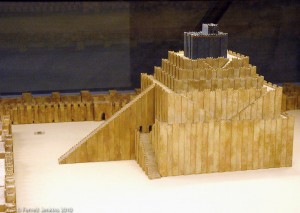 Ziggurat Model in Pergamum Museum, Berlin[/caption]Let’s consider Genesis 28:10-22. This passage is famously remembered as “Jacob’s Ladder.” Here God appears to Jacob in a dream. The LORD stands above a ladder (or “flight of steps”) and makes great promises for Jacob and his family’s future. There are similarities and differences between Jacob’s dream and another famous passage in Genesis: the Tower of Babel. The connection between the two stories is clearest in the stairways or flights of steps (Genesis 28:12) that reach to the heavens (Genesis 11:4). In both passages, a ziggurat is being described. A ziggurat was a large building that invited the gods to come down the steps from heaven and bring their blessing to the earth. The builders of Babel set the ladder up in the earth; in Jacob’s dream, God is the builder and he sets up the ladder. Due to a distorted grasp of God, the builders in Babel thought he could be coerced to give them the heavenly life; in Jacob’s dream, the LORD comes to Jacob to explain how the heavenly life will be brought to the earth. The point is this: the blessed life that humanity desires will not come through human technological advancement but through God’s covenant with Abraham.Eventually, many centuries after Jacob dreamed that dream, Jesus, a son of Abraham, spoke with a man named Nathanael. He explained to Nathanael that he is the ultimate fulfillment of Jacob’s ladder (J
Ziggurat Model in Pergamum Museum, Berlin[/caption]Let’s consider Genesis 28:10-22. This passage is famously remembered as “Jacob’s Ladder.” Here God appears to Jacob in a dream. The LORD stands above a ladder (or “flight of steps”) and makes great promises for Jacob and his family’s future. There are similarities and differences between Jacob’s dream and another famous passage in Genesis: the Tower of Babel. The connection between the two stories is clearest in the stairways or flights of steps (Genesis 28:12) that reach to the heavens (Genesis 11:4). In both passages, a ziggurat is being described. A ziggurat was a large building that invited the gods to come down the steps from heaven and bring their blessing to the earth. The builders of Babel set the ladder up in the earth; in Jacob’s dream, God is the builder and he sets up the ladder. Due to a distorted grasp of God, the builders in Babel thought he could be coerced to give them the heavenly life; in Jacob’s dream, the LORD comes to Jacob to explain how the heavenly life will be brought to the earth. The point is this: the blessed life that humanity desires will not come through human technological advancement but through God’s covenant with Abraham.Eventually, many centuries after Jacob dreamed that dream, Jesus, a son of Abraham, spoke with a man named Nathanael. He explained to Nathanael that he is the ultimate fulfillment of Jacob’s ladder (J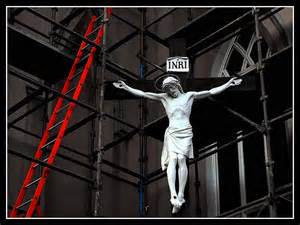 ohn 1:51). Jesus Christ is the way that heaven and earth are bridged so that God’s Kingdom can come to earth as it is in heaven. And rather than pleading our great worth to the Father because of our development of super-computers, Jesus died for our sins. Ultimate human flourishing required the sacrifice of the Son of God, not more hours at the office.Now, technology is not opposed to the Kingdom of God. Although some may say that we must choose between science and faith, we ought to see the two as linked: science and faith. Technological advancement is not enough to bring about true human fulfillment. God must be at the center of the equation and Jesus, the son of Jacob, is the only mediator between God and men (2 Timothy 2:5). He is Lord of all, and all, including technology, must be brought into submission to his good purposes for the world.QUESTIONS FOR CONVERSATION1. What technologies do you use most? How are they typically used? Do you find yourself using them that way? Is that use helping to shape you and others into the way of Christ?2. Have you ever heard anyone make the argument that humanity’s best future lies in technological advancement? Can you think of movies or TV Shows that have featured that hope?3. How is the covenant with Abraham (Genesis 12) the way that God will bring true human fulfillment to the earth?4. How has technology furthered the Kingdom of Jesus? How might it hinder it?
ohn 1:51). Jesus Christ is the way that heaven and earth are bridged so that God’s Kingdom can come to earth as it is in heaven. And rather than pleading our great worth to the Father because of our development of super-computers, Jesus died for our sins. Ultimate human flourishing required the sacrifice of the Son of God, not more hours at the office.Now, technology is not opposed to the Kingdom of God. Although some may say that we must choose between science and faith, we ought to see the two as linked: science and faith. Technological advancement is not enough to bring about true human fulfillment. God must be at the center of the equation and Jesus, the son of Jacob, is the only mediator between God and men (2 Timothy 2:5). He is Lord of all, and all, including technology, must be brought into submission to his good purposes for the world.QUESTIONS FOR CONVERSATION1. What technologies do you use most? How are they typically used? Do you find yourself using them that way? Is that use helping to shape you and others into the way of Christ?2. Have you ever heard anyone make the argument that humanity’s best future lies in technological advancement? Can you think of movies or TV Shows that have featured that hope?3. How is the covenant with Abraham (Genesis 12) the way that God will bring true human fulfillment to the earth?4. How has technology furthered the Kingdom of Jesus? How might it hinder it?
Ephesians 3:14-4:1
14 For this reason I bow my knees before the Father, 15 from whom every family in heaven and on earth is named, 16 that according to the riches of his glory he may grant you to be strengthened with power through his Spirit in your inner being, 17 so that Christ may dwell in your hearts through faith—that you, being rooted and grounded in love, 18 may have strength to comprehend with all the saints what is the breadth and length and height and depth, 19 and to know the love of Christ that surpasses knowledge, that you may be filled with all the fullness of God.20 Now to him who is able to do far more abundantly than all that we ask or think, according to the power at work within us, 21 to him be glory in the church and in Christ Jesus throughout all generations, forever and ever. Amen.4 I therefore, a prisoner for the Lord, urge you to walk in a manner worthy of the calling to which you have been called,


